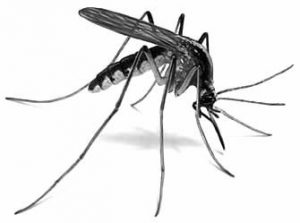What is Malaria?
Malaria is a disease caused by the bite of an infected mosquito. The bite allows tiny parasites to enter the bloodstream. Only some species of the Anopheles mosquito carry this parasite, and they live in certain areas or countries. This particular mosquito tends to feed between dusk and dawn.
Malaria is a very serious disease, protection should be a priority when traveling to risk zones.
Symptoms:
Symptom onset is 1 week to months. Symptoms vary and are often flu-like; they include: fever, headache, chills, abdominal pain, muscle and joint pain, nausea/vomiting, and diarrhea.
In more severe cases malaria can cause seizures, anemia, jaundice, heart failure, kidney failure, respiratory failure, coma, and can lead to death. People who survive repeated or prolonged episodes of malaria are only partially immune to infection.
Past immunity still means you need malaria prevention
Malaria immunity wears off after a few years once a person moves away from a risk area. People who move to Canada require anti-malaria medication when visiting or returning to these areas.
How to Protect Yourself
If you are travelling to an area at risk of malaria, you need to protect yourself before you travel, while travelling, and when you return home.
Anti-malaria medication can be prescribed at the Nova Travel and Immunization if you are travelling to a risk zone. It is important to still practice insect precautions.
**For more information on insect repellents, please see Protection Against Insect Bites.**
Before travel
At least one month before you travel, speak with a travel clinic nurse or doctor. Ask about the risk of malaria in the area you plan to visit. If anti-malaria medications are recommended, The Nova Travel Health and Immunization Clinic will give you a prescription.
Most anti-malaria medication should be started at least one week before travelling. Make sure you are aware of the possible side effects of the prescribed anti-malaria medication, and that you know how to take the medication correctly. It is best to take the medication with food and lots of water to reduce stomach upset.
While travelling
It is important that you take your anti-malaria medication for the entire time you are travelling. If you have side effects from the medication, do not stop taking it without getting advice from a doctor.
You can reduce your chance of malaria infection by 90 per cent or more by doing the following:
- Preventing mosquito bites.
- Wear light coloured clothing, long sleeve shirts, pants, and socks. Treat clothing with an insect repellant prior to wearing them.
- When you are outside between dusk and dawn, use insect repellant on all exposed skin. The most effective repellants contain the ingredient DEET. In Canada, DEET products are not recommended for use in children younger than 2 years of age. However, for children 6 months to 2 years of age, the risk from malaria is greater than the risk of DEET repellants when applied properly.
- Burn pyrethroid mosquito/insect coils in the evening in well-ventilated areas.
- Sleep in places with screened windows and doors, or with air conditioning.
- Sleep under a small-mesh mosquito net that has no holes and has been sprayed with an insecticide. Tuck the mosquito net under the mattress before it gets dark each day, or first thing in the morning, to prevent mosquitoes from getting into your bedding. The mosquito net is important if you cannot stop mosquitoes from entering your room.
- Spray insecticidal spray indoors in the evening.
- Use non-perfumed cosmetics and toiletries. Mosquitoes are attracted to scented products.
When you return home
Anti-malaria medication does not prevent mosquito bites, or parasites from getting into your body. Once inside your blood, the parasites multiply. The medication stops the parasites from multiplying.
You must continue to take your anti-malaria medication from 3 days to 4 weeks after leaving the area at risk of malaria. This depends on which drug you are prescribed, and whether you return home or travel to another destination. If the medication is not taken for the recommended length of time, the parasites may start to multiply in your blood and make you sick.
Even when taking anti-malaria medication, there is a small chance of developing the illness, sometimes months later. If you develop a fever within a year of your return home, or other symptoms such as persistent headaches, muscular aches and weakness, vomiting or diarrhea, speak with your doctor and tell him\her about your travels. Early diagnosis can prevent serious complications.




![malaria_2012_west-Ox_CNV [Converted]](https://novatravelclinic.com/wp-content/uploads/2010/12/malaria-map-south-america-208x300.jpg)